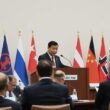Ukrainian Refugees Struggle to Find Work in Switzerland, Despite Privileges
A stark contrast in employment rates among refugee groups in Switzerland has raised questions about the integration of Ukrainian refugees. While Syrians and Eritreans have a higher employment rate, Ukrainians lag behind with a mere 29 percent.
The privileged access to the Swiss labor market, granted to Ukrainians under the S protection status, has not yielded the expected results. This status, introduced in March 2022, allows Ukrainians to work immediately, bypassing the lengthy asylum process, and receive state support.
However, a closer look at the situation reveals that other refugee groups, facing more bureaucratic hurdles, have a higher employment rate. Eritreans and Afghans, for instance, often struggle with language barriers and unacknowledged diplomas, yet they are better integrated.
Motivation and willingness to adapt to the Swiss labor market may be a crucial factor in the difference. Employers report that many Ukrainians are reluctant to take on low-skilled or low-paid jobs, instead seeking office positions, often in top management. This attitude can be unsettling for companies seeking long-term, reliable workers.
Cultural differences also play a role, as the Swiss education system, which emphasizes practical training and the dual education system, may be unfamiliar to many Ukrainians, who grew up with the Soviet education system. The willingness to adapt to the Swiss labor market may also be lacking in many Ukrainians.
While left-wing parties, such as the Social Democratic Party, demand further investments in language courses and expedited recognition of qualifications, conservative voices, like the Swiss People’s Party, take a different approach. They criticize the S protection status as no longer justified and demand its abolition, arguing that financial incentives for integration send the wrong signal and burden the social system unnecessarily.
The millions of Swiss francs invested in supporting Ukrainian refugees have yet to yield the desired results. It may be time to tie integration measures to performance and engagement. Those who benefit from generous state support should be willing to contribute their part.
The numbers speak a clear language: other refugee groups succeed in finding a place on the Swiss labor market, often under more challenging conditions. Ukrainian refugees, on the other hand, seem to be not utilizing their privileges to the same extent. The question remains: for how long will society tolerate these differences?





